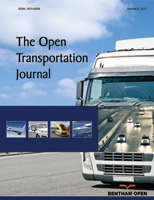
The Open Transportation Journal
The Open Transportation Journal, a peer-reviewed journal, is an important and reliable source of current information on developments in the field. Emphasis is placed on publishing quality papers, making them freely available to researchers worldwide.
Editor-in-Chief:
-
Tiziana Campisi Department of Engineering and Architecture
University of Enna Kore
Enna
Italy
ISSN: 2667-1212 (Print)
eISSN: 1874-4478 (Online)



